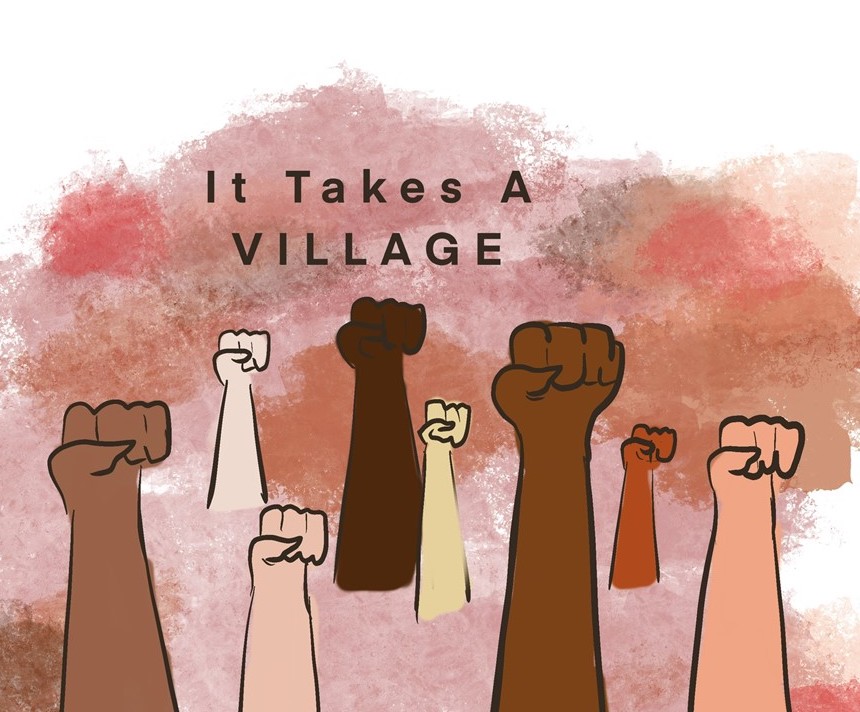Photo courtesy of CSUDH.
By Andrea Espinoza, Staff Reporter
Opening the heart to courageous conversations. Encouraging each other to grow and heal together. Working in unison to defeat systemic and institutionalized racism.
Clearly, there was a great deal going on Thursday, Feb. 11 during the university’s third virtual racial solidarity “It Takes a Village” event.
Launched in early September last year, three months after the killing of George Floyd by a Minneapolis police officer began reckoning with institutionalized racism across the country, some of the most prominent organizations on this campus realized that cooperation, not confrontation is what our students needed.
The event centered on microaggressions and anti-racism. It was led by featured speakers Kitty Fortner and Yesenia Fernández, members of the Graduate Education faculty, who led the conversation. They were followed by participants being divided into breakout rooms for smaller group conversations and exercises.
Fortner was clear from her opening remarks what she felt about the word race.
“I want to open up our space with this defining thought, Fortner said. “Race is a historical and a social construct that powers and privileges some while it minimizes and marginalizes some.”
Fernandez explained microaggression are unintentional discrimination comments that are forms of subtle “racialized and gendered assumptions.” These slight remarks can weaken one’s self-confidence and self-image.
“Unfortunately, all of us are going to have to navigate microaggression daily in our lives,” Fortner said. “These can be so subtle that we may not be able to recognize them at all. We’ve all lived through racialized experiences.
As microaggressions are common in everyday life, Fernandez pointed out that they don’t just happen in the workforce, but also in college campuses.
Examples of institutional microaggressions can be an instructor overlooking a student due to race or a peer making a derogatory comment about one’s intelligence.
“Institutional microaggressions end up creating an imposter syndrome,” Fernandez said. “This mismatch of the cultural capital of the academy with our homes, with our families, and with our culture.”
Within the breakout rooms, participants stated that skin color was the number one thing pointed out to them when they had experienced microaggressions.
“Even though we may have our differences, if we can interact and to learn different things we can come together to make something beautiful.”
Joshua Zion
One person brought up a frequent statement by many such as “you speak so well.” Many participants felt offended by those aggressions that insinuated that they were uneducated or that English wasn’t their first language. Although this was a public event, organizers asked that participants’ comments be kept private.
Student facilitator Joshua Zion, a political science major, concluded the workshop by giving students tips on how to deal with racism and a recap on how to manage microaggression.
Zion highlighted ways students can help others who may be experiencing an uncomfortable situation and how to use social media to spread awareness.
“Even though we may have our differences, if we can interact and to learn different things we can come together to make something beautiful,” Zion said.
“As you hear those experiences and stories you can educate yourself and elevate others to understand what this particular group may feel or what this idea makes them feel like and how to deal with it.”
Monique Turner, a faculty member in the CSUDH psychology department and one of the main forces behind the creation of the series, said that three events in, patterns are emerging.
She believes more students seem more eager to talk and share their perspectives, but that there is still some work to be done to encourage others that it is “OK to feel and share (those feelings).”
What she is most gratified after the three events is that during this collective healing process, participants are not passively waiting to heal, but are taking action.
“Each student is gaining their power back, and that to me is great progress,” Turner said.

